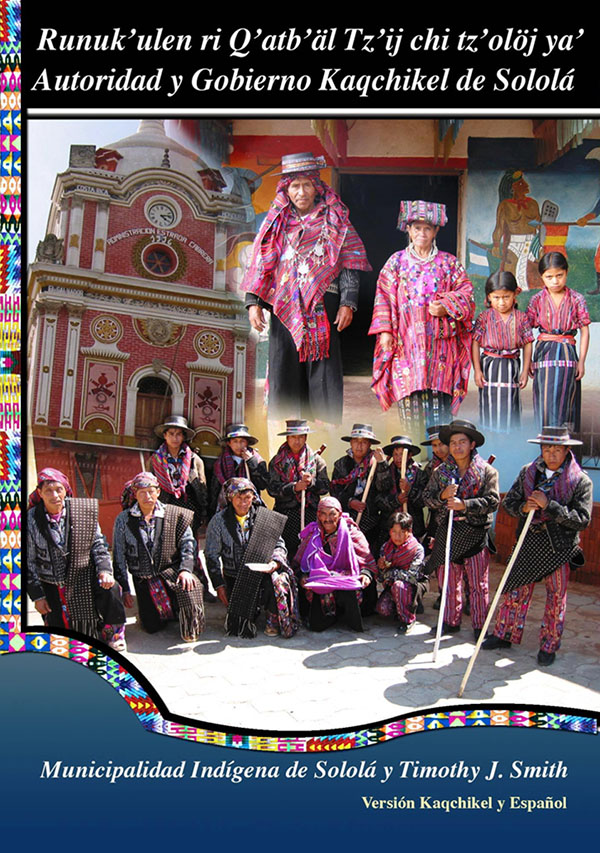BOONE — Imagine you’re a middle school student studying civics or local government, and instead of reading a textbook written in your native language, you must read the material in another.
Timothy J. Smith, an assistant professor in Appalachian State University’s Department of Anthropology, has led a project to publish the first social science text written in a Guatemalan Mayan language. It will be distributed in May to Mayan authorities and leaders who participated in the project to create the text, as well as school officials, teachers and students in Sololá, Guatemala.
Copies will also be available at Appalachian, where they may be used in a future program to teach the Mayan language.
The project grew out of a Fulbright grant Smith received in 2001 to conduct dissertation field work in Sololá, where he studied the customs, traditions and practices of the town’s indigenous government.
“Many cultural anthropologists are involved in collaborative projects where we are not just extracting information from the communities in which we work but also making an earnest attempt to somehow give back to those communities,” Smith said. “I thought it would be interesting as a foreign researcher to ask the people with whom I was going to work what I could offer them.”
The town leaders asked for a textbook written in their native language that could be used to teach students about the political and cultural history of their town, as well as their local form of government that includes women’s participation in elections and democracy. Spanish is typically used in Guatemalan schools.
“From the point of view of anthropology, this is a cutting-edge project,” said Dr. Gregory Reck, chair of Appalachian’s Department of Anthropology. “Anthropologists have come to increasingly recognize the ethical responsibility that their research carries, and in the past have tried to give something back to those communities. This kind of project goes well beyond what most anthropologists are able to contribute.”
Smith speaks Kaqchikel Mayan and his research interests include indigenous languages and Mesoamerica, Guatemala and Ecuador. Working with a team of three other researchers, he developed topics to include in the text and then translated the information into Kaqchikel Mayan.
As hard as that might sound, it was finding funding for the publication of their work that became the challenge – a process that took more than eight years. “It was a long hard battle to find funding for the publication,” said Smith, who had approached the United Nations and a variety of foreign embassies for support. “They told me that while it was a wonderful project, they didn’t have the funds needed to publish the text.”
That explanation didn’t sit well with Mayan leaders who didn’t understand why the international aid money sent to help reconstruction efforts after their country’s 36-year civil war ended in 1996 didn’t target the creation of cultural materials or texts and pedagogical materials in the Mayan languages, Smith explained.
Smith secured funding for his project through Appalachian’s Office of International Education and Development, Department of Anthropology and College of Arts and Sciences, areas he says saw the project fitting into the university’s strategic goals in terms of internationalizing the university, and giving back to the international community. It also fit Appalachian’s identity as an institution of higher learning that trains the next generation of teachers.
“This book connects with Appalachian’s internationalization mission of developing awareness, knowledge, appreciation and respect of cultural difference in both domestic and international contexts in our students, faculty and staff,” said Dr. Jesse Lutabingwa, associate vice chancellor for international education and development. “I am very pleased that a member of our faculty has written this book that represents the first social science text published in a Guatemalan Mayan language.”
The university’s support of just more than $6,000 enabled Smith to publish 1,000 copies of the book, titled “Kaqchikel Authority and Government in Sololá, Guatemala.” It covers democracy, indigenous law and authority, autonomy, and community decision making.
“Most of the Mayan language publications you find in Guatemala are wonderful, but they are children’s texts. There was nothing above the elementary school level reading,” Smith said. “This book will serve a number of goals. It will let students learn about their own culture and history and provide tools to teach literacy in the Mayan languages.”
Smith also is co-editor of the recently published book “After the Coup: An Ethnographic Reframing of Guatemala 1954” and “Mayas in Postwar Guatemala: Harvest of Violence Revisited.”
What do you think?
Share your feedback on this story.
About the Department of Anthropology
The Department of Anthropology offers a comparative and holistic approach to the study of the human experience. The anthropological perspective provides a broad understanding of the origins as well as the meaning of physical and cultural diversity in the world — past, present and future. Learn more at https://anthro.appstate.edu.
About the College of Arts and Sciences
The College of Arts and Sciences (CAS) at Appalachian State University is home to 17 academic departments, two centers and one residential college. These units span the humanities and the social, mathematical and natural sciences. CAS aims to develop a distinctive identity built upon our university's strengths, traditions and locations. The college’s values lie not only in service to the university and local community, but through inspiring, training, educating and sustaining the development of its students as global citizens. More than 6,800 student majors are enrolled in the college. As the college is also largely responsible for implementing App State’s general education curriculum, it is heavily involved in the education of all students at the university, including those pursuing majors in other colleges. Learn more at https://cas.appstate.edu.
About Appalachian State University
As a premier public institution, Appalachian State University prepares students to lead purposeful lives. App State is one of 17 campuses in the University of North Carolina System, with a national reputation for innovative teaching and opening access to a high-quality, cost-effective education. The university enrolls more than 21,000 students, has a low student-to-faculty ratio and offers more than 150 undergraduate and 80 graduate majors at its Boone and Hickory campuses and through App State Online. Learn more at https://www.appstate.edu.













